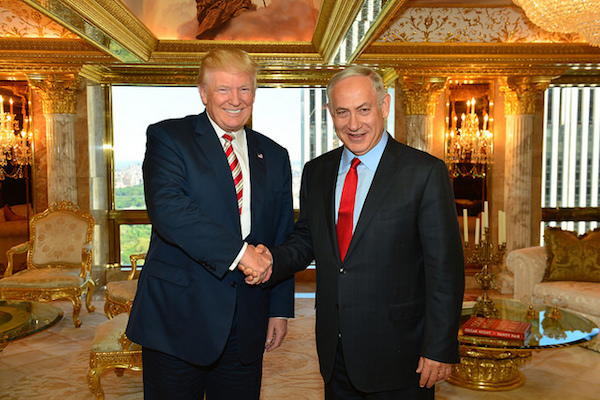From race baiting to fear mongering to warning of liberal media conspiracies against him, the Republican presidential candidate is doing exactly what Netanyahu did to get re-elected. But the Israeli prime minister had something Trump doesn’t.

There is a lot about Donald Trump’s presidential campaign that is worryingly reminiscent of Benjamin Netanyahu’s electoral antics, particularly his willingness to say just about anything, regardless of the consequences as long as he thinks it might be politically expedient. Beyond style and personality, however, the tactical similarities in their respective campaigns’ final stretches are even more disturbing.
In particular, Trump’s recent, wildly unspecified warnings of voter fraud in inner-cities closely mimic Netanyahu’s election-day warning that Arab voters were being bussed to the polls in droves. Both warnings were designed to increase turnout among white — or in Israel’s case, Jewish — conservative voters by stoking fears that minorities are attempting to influence the democratic process by voting.
Such warnings play off the fears and resentments of both men’s core voters — the idea that their kind, the traditional face of their respective nations, might lose demographic majorities, and subsequently, political power. In Israel that fear, which most Jews do not consider racist to discuss, is known as “the demographic threat” — that Israel will no longer be able to justify its Jewishness democratically if non-Jews become a majority in its democracy (or even among those it rules undemocratically). In the United States these days, such fears are generally only expressed outside the home by white supremacists, but Trump seems to believe that with this type of rhetoric, he can evoke latent and even sub-conscious racism in mainstream white voters.
Another tactic Donald Trump has been trying out is warning, as a statement of fact, that ISIS will take over the United States if his opponent is elected. Benjamin Netanyahu made almost identical claims in the days and weeks before the Israeli elections last year, publishing television advertisements that quite literally showed ISIS fighters driving toward Jerusalem, and declaring: “The Left will surrender to terrorism. It’s us or them.” The message was that a victory for his opponents meant an invasion by ISIS.
A third (although not the last) tactic that Trump is borrowing from Netanyahu’s playbook is his numerous declarations that there is a widespread liberal media conspiracy to elect his opponent. Just three days before the elections in Israel last year, Netanyahu made an almost identical declaration: “Left-wing and media elements in Israel and abroad have conspired to bring [Zionist Union leaders Isaac Herzog and Tzipi Livni] to power illegitimately, by means of slander at home and unprecedented money from abroad.”
All three tactics are textbook examples of fear mongering, and be warned: it worked for Netanyahu. The prime minister, who is not that popular of a politician in Israel, was behind in many polls leading up to election day primarily because he was losing votes to smaller right-wing parties. By successfully convincing those voters that a ballot cast for any right-wing party other than his own would guarantee a victory for the Arabs/ISIS/Hamas/left-wing media conspiracy/nefarious foreign powers/Isaac Herzog, he was ultimately able to convince enough voters to cast a vote for him, albeit apprehensively.
These are strong parallels for the Trump campaign to draw on, particularly as the Republican candidate has been hemorrhaging not insignificant numbers of conservative voters to Libertarian candidate Gary Johnson. But that doesn’t mean what worked for Netanyahu will necessarily work for Trump.
Netanyahu had something that Trump doesn’t, a factor that lent just enough credence to his fear mongering and conspiratorial race baiting to make them effective: years of experience as prime minister and a (questionable) track record of keeping Israelis safe. Making things even easier, Netanyahu’s equally unpopular opponent had no prime ministerial experience or security credentials.
In other words, for just enough Israeli voters, Netanyahu was the safe bet. In the United States, Donald Trump is the wild card.
Perhaps the most important difference, however, is that in Israel’s parliamentary system, Netanyahu’s Likud party only had to win 23 percent of the vote to win the election.

